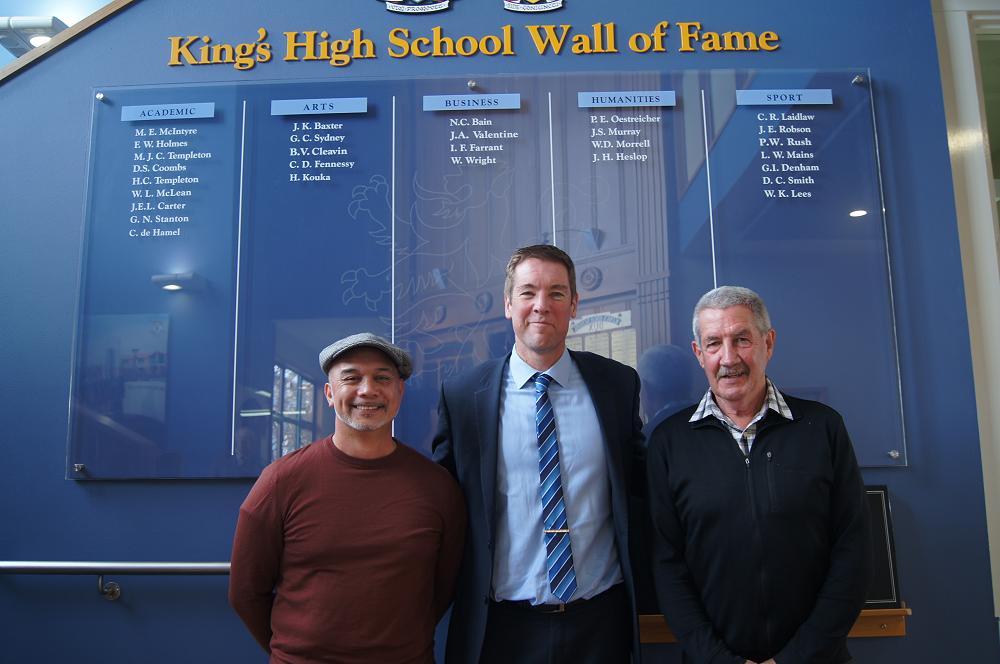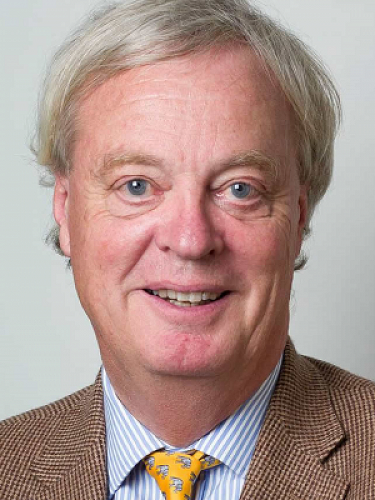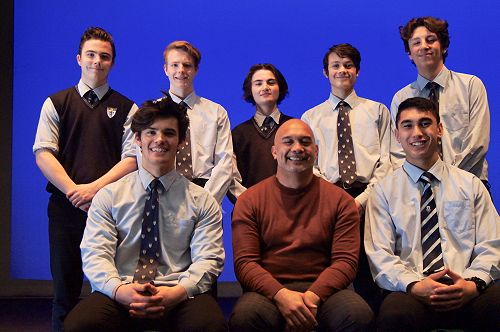
Wall of Fame 2018
Celebrating our alumni reminds us of where we have come from and inspires the young men currently studying at King's to take every opportunity and to embrace all that life has to offer.
Our three Wall of Fame inductees for 2018 exemplify the notion of making the most of life, as can be seen below in their citations. As always, it was a pleasure to honour and recognise their achievements since leaving King's and to listen to two of the inductees, Hone Kouka and Warren Lees, share their wisdom and memories of King's at the special assembly.
Christopher de Hamel - Academic1963 - 1967
Christopher has been very much his own person for virtually all of his life, and maintained a low profile while progressing steadily through King’s. However, as an avid collector of stamps he helped to resuscitate the defunct Stamp Club, and even became Club President in his final year.
14 year old Christopher chanced upon an exhibition of A.H. Reed’s small collection of medieval manuscripts at the Dunedin Public Library and was “hooked’ by these illuminated manuscripts. During his school holidays, he hitchhiked around NZ to see the 77 recorded manuscripts. In 1969, while still a young History under graduate at the University of Otago, the Public Library published his first book, entitled Books of Hours. In 1972, Christopher graduated with a BA (Hons) in History choosing to study the Treaty of Waitangi for his dissertation topic, possibly because it was one of NZ’s oldest documents.
Progressing to Oxford University, he achieved fame and a reputation to the extent that Sotheby’s, the famous London auctioneering firm, offered him employment in 1975 as the expert in illuminated manuscripts, three years before he completed his D Phil Degree on 12th Century Bible Commentaries. Before long he headed a high-profile department with an annual turnover frequently in excess of £10 million.By the end of the 1980‘s he was the world’s pre-eminent merchant and cataloguer of medieval manuscripts, and had negotiated the sales of all eight of the most expensive manuscripts sold at auction, including the Gospels of Henry the Lion for nearly £12 million, and in the following year he arranged the private sale of the Furstenberg manuscripts for 48 million deutschmarks. Because of his scholarly passion and despite being fully employed, he found time to publish major monographs, guides, and reviews, in 2001 publishing The Book: A History of the Bible, which tells the Bible story as an artefact and not as a theological treatise.In 2002 he was appointed Donnelly Fellow Librarian at Corpus Christi College, Cambridge University, being the first full-time curator since the Library was established in 1352. In 2005 he completed a Ph.D. at Cambridge, and in 2010 was the recipient of a Festschrift (a collection of writings published in honour of a scholar) which was contributed to by some 50 authors. In 2016 he published Meetings with Remarkable Manuscript’s. The book has been favourably reviewed, winning the Duff Cooper Prize for the best non-fiction book of 2016, and in 2017 the Wolfson History Prize, valued at £40,000.
Christopher retired at the end of 2016, although he remains a consultant (Senior Vice President) for Les Enluminures, of Chicago, New York, Paris and London. In 2002 the University of Otago awarded him with an Honorary Doctorate of Literature, with the History Department believing that he is their most illustrious product of his generation.
Hone Kouka - Arts
1982 - 1985
Hone is of Maori descent and his iwi affiliations are Ngati Porou, Ngati Raukawa and Ngati Kahungunu. Arriving at King’s in his fourth form year, he impressed immediately because of his friendly manner and his multitude of talents. He participated in everything available, representing the school in Basketball and as an aggressive loose forward in Rugby: sadly a promising career in Rugby ended when he was literally ground into the mud at Littlebourne. In his final year at King’s he was awarded his Rugby Blue, acted in the major production Salad Days (for which he received a Drama Blue), was a Prefect and chaired the School Council. Hone had also developed a love of literature, having been mentored by his inspirational teacher of English, Mr Paul Aubin and progressed to Otago University, where he graduated with a BA Degree in English in 1988 and followed this two years later by gaining a Diploma in Drama from Te Kura Toi Whakaari o Aotearoa/NZ Drama School.
By then Hone had realised that a Maori voice was missing on the stage of NZ Theatre and became determined to rectify this omission. He had attended playwright workshops in Wellington (1988), Nelson (1990) and Canberra (1992). His first play Mauri Tu was performed at Otago University in April 1991 for which he was rewarded with the Wellington Theatre Award for being the most promising newcomer in 1991. In 1992 he lectured and performed at University Drama classes in Sydney and Melbourne and was the youngest ever to win the 1992 Bruce Mason Playwrights’ Award and the 1992 Chapman Tripp Theatre Award for the most original production, for his play Hide ‘n’ Seek. He was awarded the Atairangikahu Award for Drama in 1993 and the Chapman Tripp Theatre Award in 1994 for the best NZ play for Te Tangata Toa an Ibsen inspired work which was heralded as a masterpiece in NZ Theatre.
In 1996, Hone was Writer-in-Residence at Canterbury University, when he was commissioned to write Waiora Te U Kaipo (The Homeland) for the 1996 NZ International Festival of the Arts: the play which is reminiscent of a Greek chorus subsequently toured nationally and internationally. In 2006, The Prophet completed a trilogy of plays – which included Home Fires and Waiora – which has been described as “moving, funny and definitely unforgettable.” In 2011, to celebrate the holding of the Rugby World Cup in NZ, and to show that “you could rise to greatness from humble beginnings”, Hone wrote I: George Nepia, the story of his great uncle whom many of the older generation still regard as NZ’s greatest All Black.
As well as writing plays, Hone writes prose, poetry, short stories (especially for children), novels, non-fiction, articles, reviews, films, TV productions and (with others) Waiata. Much of his work revolves around family, conflict, identity, truth, prejudice and how these themes can lead to alienation and even isolation. He has worked as a Development Executive with the NZ Film Commission, where he mentored Maori and non-Maori film makers and for Radio NZ’s Drama Department. In 2009 he was created a Member of the NZ Order of Merit (MNZM) for Services to Contemporary Maori Theatre.
Last year, Hone came to Dunedin to work with some of our Year 12 Drama students on an excerpt of Waiora and today, they had the privilege of working with him again - hence the photo at the end of this article. Hone has made a huge and lasting impact on these students and we are grateful for his input into their learning.
Warren Lees - Sport
1965 - 1969
Warren started small as a ball boy at Carisbrook, which was at that time the home of Otago Rugby and Cricket. It was inevitable that he would be attracted to both sports when he arrived at King’s, having already represented Otago and the South Island in Cricket at Primary School level. He represented King’s in each code at 1st team level for three years: in Rugby at both half back and fullback, and like his elder brother Keith, was the Cricket Captain in his final two years. Against Shirley Boys’ he shared in a 291 run partnership, scoring 136 himself and in 1969 he led the 1st XI to win the Dunedin 2nd grade club competition, scoring 147 against Otago Boys’. While at school he was a member of the Otago Brabin Cup Team (under 20), and was later selected for the full NZ Team, for whom he played for five years. A Prefect in his final year, he then proceeded to Dunedin Teachers’ College where he trained as a Primary School Teacher, during which time he was selected for the NZ Under 23 Team and for the Otago Plunket Shield Team. He also represented the Otago 2nd Grade Rugby Team at fullback. He then secured a teaching position at Balmacewen Intermediate School.
In 1976, while holidaying in Europe with his wife, Warren was selected to tour the Indian Sub-Continent playing three tests against both Pakistan and India. In the third test against Pakistan he rescued the team from a difficult position by scoring 152, which was at that time the highest test score by a NZ wicket keeper. He represented NZ in 21 Test matches, taking 52 catches and 7 stumpings, while scoring 778 runs at an average of 23.57. In ODI Cricket he played in 31 matches, taking 28 catches and 2 stumpings while scoring 215 runs at an average of 11.31. His international career in both forms of the game finished in 1983
Statistics can be difficult to follow but Warren’s tell the story of an incredibly successful cricket career. He played 146 first class matches, taking 304 catches and effecting 44 stumpings, while scoring 4,932 runs at an average of 24.66, including 5 centuries and 18 half centuries. He captained Otago for 9 years, during which time they won the Shell Trophy three times and the Shell Cup once. As Warren neared retirement he was the first Otago player to be awarded the English Tradition of a Benefit Year. In the 1989 Queen’s Birthday Honours list, he was made a Member of the Order of the British Empire (MBE) for Services to Cricket. In 1989 he turned his attention to coaching Otago which led in 1990 to his being appointed coach of the national team. In 1992 he coached the Martin Crowe led team to reach the semi-final of the World Cup Tournament, losing to the eventual champions Pakistan. However, later that year bomb blasts in Sri Lanka threatened the safety of the team and he found himself no longer required as coach. He then worked full time for the Otago Cricket Association before managing the Otago Boys’ hostel for four years, the Cumberland Hall of Residence at Otago University for four years and the Hall of Residence at Canterbury University for three years.
In 2013 Warren began coaching Women’s Cricket, the Otago Sparks, winning two titles in five years. This led in 2015 to him coaching the White Ferns. When he had retired as a player he thought that representing NZ was the ultimate, but he has found that coaching NZ men’s and women’s teams had actually been a bigger highlight.
Warren is a man of principle who has probably contributed more to Otago Cricket than anybody else as a player, coach and administrator. For his endeavours he has been made a Life Member of the OCA and been honoured by a special dinner, only the fourth Otago great to be so rewarded. He has proved to be an excellent mentor to young people both within the world of Cricket and beyond.
Gallery


